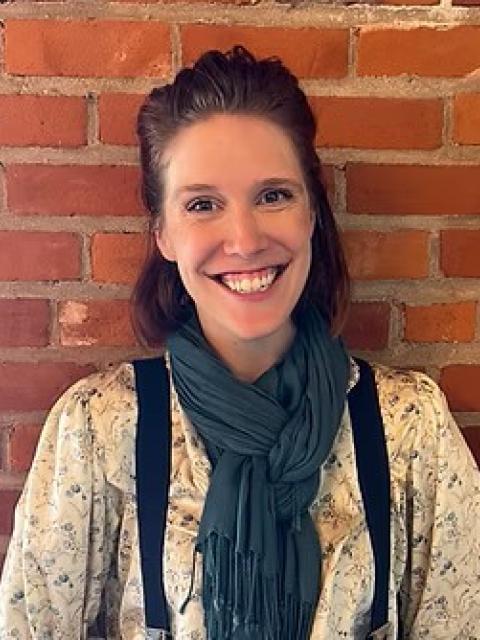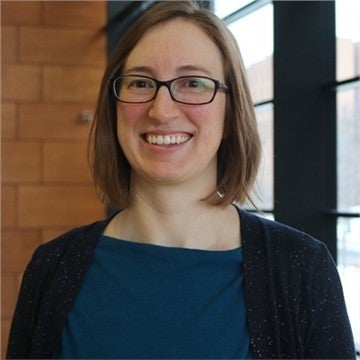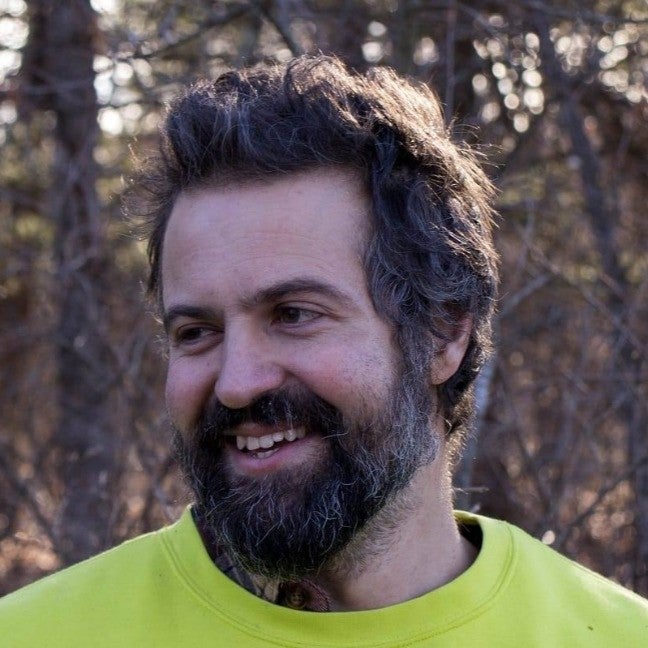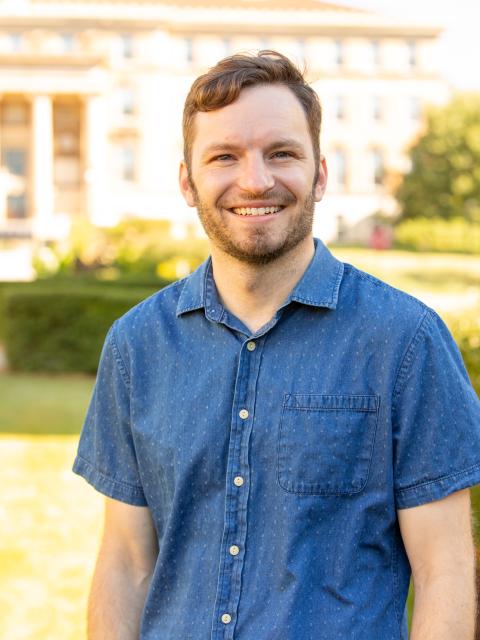Red Cedar Watershed Conference
Thursday, March 13, 2025
8:30 a.m.-4:00 p.m.

2026 Morning Keynote
8:45-10:00 a.m.
The Future of the Red Cedar - How can we intentionally direct the future we want in our watershed
Tara Greiman - Director of Conservation and Stewardship - Wisconsin Farmers Union
The Future of the Red Cedar - How can we intentionally direct the future we want in our watershed?
Many people think of rural landscapes as relatively unchanging and stable, but with changing agricultural markets, higher demand for energy, and expanding land needs, there are many potential changes that rural communities will have to contend with. Instead of waiting to react to the winds of change, let's talk about how we can intentionally aim for a positive future as a community in our food, energy, water, and landscape systems.
Tara Greiman is the Wisconsin Farmers Union Director of Conservation and Stewardship. In this role, she connects the many conservation-focused projects of the WFU to help promote win-win scenarios that benefit farmers, our food system, and our environment. These projects include grassroots efforts of WFU natural resource committees, partnering with staff projects to serve our watershed program, rural energy systems, and enhancing the connection between healthy local food systems, communities, and the environment.
2026 Afternoon Keynote
12:15 p.m. - 1:15 p.m.
10 Years into TMDL/Watershed Monitoring
Nicole Hayes is an Assistant Professor at UW-Stout in the biology department
Keith Gilland is an Associate Professor at UW-Stout in the biology department


Nicole Hayes Keith Gilland
10 Years into TMDL/Watershed Monitoring
The waters of the Red Cedar River Basin are listed as impaired based on nutrients, sediments, and excessive algal growth by the Wisconsin Department of Natural Resources. The levels of pollutants and impairments are the result of complex interactions between land use, groundwater, bedrock, and ongoing management activity. To fully understand the causes and effects of the degradation of the land and water of the Red Cedar River Basin, it is crucial that we collect long-term monitoring data. The Red Cedar Basin Monitoring Group has long been a part of efforts to restore the watershed, and funding from the Freshwater Collaborative of Wisconsin has allowed us to create an internship program that supports standard monitoring alongside student training and research. Along with students and other faculty members, we have collected data on the extent of harmful algal blooms and the concentrations of cyanobacterial toxins in Menomin and Tainter lakes. We have also collected data on the long-term stability and functionality of reach-scale restoration projects on Gilbert and Wilson creeks, along with the impacts of urbanization and reach-scale corridor improvements along Galloway Creek in the city of Menomonie. These projects have powerful potential to serve as scalable templates for understanding and improving water conditions throughout the basin. With our next six years of funding, we will continue to train the next generation of ecosystem scientists, restoration practitioners, and water quality specialists, collect data to advance watershed science and management, and provide data for evidence-based rehabilitation of the Red Cedar Watershed.
Nicole Hayes is an Assistant Professor of Biology at the University of Wisconsin-Stout. Her research interests include water quality, under-ice primary production, and cyanobacterial harmful algal blooms. For the previous four summers, she has worked with local undergraduates (UW-Stout, UW-Eau Claire, and UW-River Falls) to sample Menomin and Tainter lakes and study the cyanobacterial blooms that occur every summer. Alongside undergraduate researchers from UW-Stout, she has conducted under-ice experiments to determine how much cyanobacterial growth is happening when the lake is frozen. Dr. Hayes graduated with her PhD in Ecology, Evolution, and Environmental Biology from Miami University in 2015. She continued studying water quality in green lakes in Saskatchewan and Minnesota prior to starting as a faculty member at UW-Stout in 2020.
Keith Gilland is an Associate Professor of Biology at the University of Wisconsin-Stout. His research focuses on the rehabilitation of both aquatic and terrestrial ecosystems of the upper Midwest, including sport fish habitat, urban stream and stormwater management, and prairie and savanna restoration. He received his doctorate in environmental biology from Ohio University in 2012 and began working at Stout in 2016. His work on monitoring the Red Cedar Basin has been funded by a series of grants from the Freshwater Collaborative of Wisconsin, and he has been participating in citizen science monitoring of the watershed through the Watershed Action Volunteers program with his students since 2017. He serves as land manager for the Chippewa Savannas chapter of the Prairie Enthusiasts and site steward for their Dobbs Landing project site located along the Red Cedar River near Colfax. He is also a member of the management board for the Colfax Red Cedar Preserve and Recreation Area and is active in conservation and restoration projects at both sites with Stout's Natural Areas Club. He is also a member of Menomonie's Urban Forestry Board.

2026 Afternoon Keynote
2:55-3:55 p.m.
Federal Agricultural Policy and the Implications for Water Quality and Soil Health
Jeff Hadachek is an assistant professor and extension specialist in the Department of Agricultural and Applied Economics at the University of Wisconsin.
Federal Agricultural Policy and the Implications for Water Quality and Soil Health
This presentation will discuss current federal agricultural policies and the ways in which they work towards or work against watershed conservation goals. We will pay particular attention to the on-farm economics and an analysis of the effectiveness of these programs. Lastly, we introduce novel policy mechanisms that can achieve conservation goals at the watershed level.
Jeff Hadachek is an assistant professor and extension specialist in the Department of Agricultural and Applied Economics at the University of Wisconsin, Madison. Jeff’s research and extension program addresses the economics of soil health and water quality in Wisconsin agriculture and the U.S. more broadly. Prior to joining UW in August 2023, he received his Ph.D. from the University of California, Davis, and is an undergraduate alumnus of Kansas State University. He grew up in North Central Kansas on his family’s row crop farm and cow-calf operation.
2025 Breakout Presentations (2026 Sessions coming soon!)
Morning Session Block
10:15-11:15 a.m.
DNR Healthy Lakes Grant Program
The WI DNR Healthy Lakes & Rivers grant program offers funding for 5 simple and inexpensive best practices that improve habitat and water quality on your shoreland property. Come learn about the Healthy Lakes grant program and how the Chetek Lakes Protection Association is using grant funds to implement projects around the Chetek Chain of Lakes.
Presenter:
Patrick Anderson, Environmental Grants Specialist for the Healthy Lakes & Rivers (HLR) grant program at the Wisconsin DNR
The Latest Agriculture Water Quality and Soil Health Research in the Red Cedar Watershed
In this session, hear some of the latest agriculture water quality research happening in the Red Cedar Watershed. This work is inspired by a need to address local water quality impairments while supporting productive agriculture. Dr. Ellen Albright will begin the session with an overview of Discovery Farms, a farmer-led research program that has been conducting water quality research on private farms across the state for over 20 years. She will present findings on the timing and driving mechanisms of phosphorus losses from row crop fields, which inspired a local look into on-farm phosphorus stratification. Kelsey Hyland, Northwest Agriculture Water Quality Outreach Specialist, will then present results from a local Phosphorus Stratification Project that engaged three farmer-led watershed groups in the Red Cedar Watershed. This project explored questions about phosphorus movement in soil health systems, dissolved phosphorus losses, and water quality risk. She will present aggregated data from this local project, watershed implications, and plans for moving forward.
The realm of soil health testing is rapidly evolving to empower farmers & agronomists with new tools that can help guide nutrient crediting and aid in the creation of crop fertilizer plans. With an emphasis on measuring various aspects of soil biology, these platforms open up new ways to consider how row crops, cover crops, microbes, and other processes make previously unmeasurable nutrient sources available to future crops, thereby reducing the need for synthetic fertilizers. This presentation will discuss two such platforms: the Haney Soil Health Test and the Cover Crop Biomass Test.
Presenters:
Dr. Ellen Albright, UW Discovery Farms Researcher
Kelsey Hyland, Agriculture Water Quality Outreach Specialist, Northwest WI
Joe Ailts, Independent Agronomist
Local Food to Support Sustainability and Water Quality: A Panel Discussion
Developing a market for locally grown and raised food that is produced in ways that benefit soil health, water quality, sustainability, and economic development is an important aspect of making the Red Cedar River watershed an attractive place to live and work. Local producers, local retailers, and local consumers can benefit themselves and the greater community through the production, sale, and purchasing of local food products. This session will offer more information on the logistics, benefits, and hurdles in the production and sale of sustainably produced local food. Three panelists will talk about their role in local food and be open for questions.
Presenters:
Logan Dwyer, Farmer
Crystal Halvorson, General Manager, Menomonie Market Food Co-Op
Sarah Lloyd, Value Chain Coordinator - Dept. of Plant & Agroecosystems Sciences and UMN Forever Green Initiative for Grassland 2.0
The LAKES Research Experience for Undergraduates Program: A Reflection on a Decade of Community-Based Water Quality Research
The Linking Applied Knowledge in Environmental Sustainability Research Experience for Undergraduates, or LAKES REU, program started in 2014 with its first summer research cohort and completed its most recent summer research season in 2024. Over that time, nearly a hundred students from around the country have spent a summer in Menomonie working with community partners, learning how to do high-quality research, and contributing important insights about water quality issues and how to address them in the Red Cedar Watershed. In this session, key takeaways from the work will be shared.
Presenter:
Tina Lee, Professor of Anthropology and Co-Director LAKES REU, University of Wisconsin-Stout
Afternoon Visioning Sessions
1:40-2:40 p.m.
What future do you want for the Red Cedar Watershed?
In the Red Cedar Learning Hub project (a UW-Stout and Grassland 2.0 collaboration), we have heard many aspired for futures for the Red Cedar Watershed. We haven’t heard your vision for it yet. This is your chance to share your vision for the Red Cedar and further build upon prior perspectives shared by your fellow community members.
What farming and land management systems obtain water quality goals?
The current EPA-approved plan for the Red Cedar Watershed provides targets we need to reach to attain meaningful water quality improvements. Currently, it is estimated that we will need to reduce phosphorus pollution by an additional 49% based on data from the last study of the watershed completed in 2018. Obtaining these goals will likely require a strategic vision and the development of societal support and market structures that help people manage land in a way conducive to obtaining shared goals. We will use SmartScape to map out potential landscape configurations to obtain the TMDL goals. Then we will discuss the institutional and market supports (and potential tradeoffs) that will be necessary for supporting those landscape transformations.
What is the role of water in health for the Red Cedar?
In the recent Dunn County Community Health Assessment having clean water was identified as a primary community health need. What does a healthy Red Cedar mean to you and what is the role of water in that vision?
What markets and supply chains do we need to support clean water?
In ongoing Red Cedar Learning Hub efforts, we used the Grassland 2.0 SmartScape tool to model various landscape scenarios needed to meet the water quality goals. The next step is to plan how to build and support markets and supply chains for the agricultural products from these new landscape configurations. In this breakout session we will look at the scope and scale of potential production systems changes (i.e. shifting acres from row crops to row crops with cover crops or to perennial pasture) and then imagine together what supply chains and markets would be needed to support the changes. We will map supply chain relationships from farm to processor, storage, market channels and consumer demand, using grass-fed beef, small-ruminants, dairy heifer grazing, and other possible products from these new landscapes as examples.
What is the role of our watershed in having an amenity rich community?
It is becoming clear that rural and small communities thrive when they are amenity-rich. In the Red Cedar Watershed, there are many amenities such as restaurants, theatres, breweries, and outdoor spaces. These amenities, however, require maintenance and ideally fit into a larger landscape vision. Simply put, amenities are part of watershed planning. In this session, we will discuss amenities identified as important by people in the Red Cedar and consider pathways for them to continue to grow and be part of the larger watershed vision.




